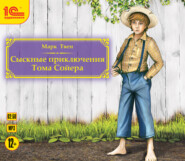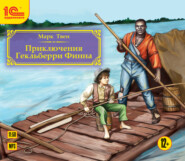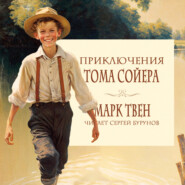По всем вопросам обращайтесь на: info@litportal.ru
(©) 2003-2024.
✖
Extract from Captain Stormfield's Visit to Heaven
Настройки чтения
Размер шрифта
Высота строк
Поля
“Seventy-two.”
“I judged so. How long you been in heaven?”
“Twenty-seven years, come Christmas.”
“How old was you when you come up?”
“Why, seventy-two, of course.”
“You can’t mean it!”
“Why can’t I mean it?”
“Because, if you was seventy-two then, you are naturally ninety-nine now.”
“No, but I ain’t. I stay the same age I was when I come.”
“Well,” says I, “come to think, there’s something just here that I want to ask about. Down below, I always had an idea that in heaven we would all be young, and bright, and spry.”
“Well, you can be young if you want to. You’ve only got to wish.”
“Well, then, why didn’t you wish?”
“I did. They all do. You’ll try it, some day, like enough; but you’ll get tired of the change pretty soon.”
“Why?”
“Well, I’ll tell you. Now you’ve always been a sailor; did you ever try some other business?”
“Yes, I tried keeping grocery, once, up in the mines; but I couldn’t stand it; it was too dull – no stir, no storm, no life about it; it was like being part dead and part alive, both at the same time. I wanted to be one thing or t’other. I shut up shop pretty quick and went to sea.”
“That’s it. Grocery people like it, but you couldn’t. You see you wasn’t used to it. Well, I wasn’t used to being young, and I couldn’t seem to take any interest in it. I was strong, and handsome, and had curly hair, – yes, and wings, too! – gay wings like a butterfly. I went to picnics and dances and parties with the fellows, and tried to carry on and talk nonsense with the girls, but it wasn’t any use; I couldn’t take to it – fact is, it was an awful bore. What I wanted was early to bed and early to rise, and something to do; and when my work was done, I wanted to sit quiet, and smoke and think – not tear around with a parcel of giddy young kids. You can’t think what I suffered whilst I was young.”
“How long was you young?”
“Only two weeks. That was plenty for me. Laws, I was so lonesome! You see, I was full of the knowledge and experience of seventy-two years; the deepest subject those young folks could strike was only a-b-c to me. And to hear them argue – oh, my! it would have been funny, if it hadn’t been so pitiful. Well, I was so hungry for the ways and the sober talk I was used to, that I tried to ring in with the old people, but they wouldn’t have it. They considered me a conceited young upstart, and gave me the cold shoulder. Two weeks was a-plenty for me. I was glad to get back my bald head again, and my pipe, and my old drowsy reflections in the shade of a rock or a tree.”
“Well,” says I, “do you mean to say you’re going to stand still at seventy-two, forever?”
“I don’t know, and I ain’t particular. But I ain’t going to drop back to twenty-five any more – I know that, mighty well. I know a sight more than I did twenty-seven years ago, and I enjoy learning, all the time, but I don’t seem to get any older. That is, bodily – my mind gets older, and stronger, and better seasoned, and more satisfactory.”
Says I, “If a man comes here at ninety, don’t he ever set himself back?”
“Of course he does. He sets himself back to fourteen; tries it a couple of hours, and feels like a fool; sets himself forward to twenty; it ain’t much improvement; tries thirty, fifty, eighty, and finally ninety – finds he is more at home and comfortable at the same old figure he is used to than any other way. Or, if his mind begun to fail him on earth at eighty, that’s where he finally sticks up here. He sticks at the place where his mind was last at its best, for there’s where his enjoyment is best, and his ways most set and established.”
“Does a chap of twenty-five stay always twenty-five, and look it?”
“If he is a fool, yes. But if he is bright, and ambitious and industrious, the knowledge he gains and the experiences he has, change his ways and thoughts and likings, and make him find his best pleasure in the company of people above that age; so he allows his body to take on that look of as many added years as he needs to make him comfortable and proper in that sort of society; he lets his body go on taking the look of age, according as he progresses, and by and by he will be bald and wrinkled outside, and wise and deep within.”
“Babies the same?”
“Babies the same. Laws, what asses we used to be, on earth, about these things! We said we’d be always young in heaven. We didn’t say how young – we didn’t think of that, perhaps – that is, we didn’t all think alike, anyway. When I was a boy of seven, I suppose I thought we’d all be twelve, in heaven; when I was twelve, I suppose I thought we’d all be eighteen or twenty in heaven; when I was forty, I begun to go back; I remember I hoped we’d all be about thirty years old in heaven. Neither a man nor a boy ever thinks the age he has is exactly the best one – he puts the right age a few years older or a few years younger than he is. Then he makes that ideal age the general age of the heavenly people. And he expects everybody to stick at that age – stand stock-still – and expects them to enjoy it! – Now just think of the idea of standing still in heaven! Think of a heaven made up entirely of hoop-rolling, marble-playing cubs of seven years! – or of awkward, diffident, sentimental immaturities of nineteen! – or of vigorous people of thirty, healthy-minded, brimming with ambition, but chained hand and foot to that one age and its limitations like so many helpless galley-slaves! Think of the dull sameness of a society made up of people all of one age and one set of looks, habits, tastes and feelings. Think how superior to it earth would be, with its variety of types and faces and ages, and the enlivening attrition of the myriad interests that come into pleasant collision in such a variegated society.”
“Look here,” says I, “do you know what you’re doing?”
“Well, what am I doing?”
“You are making heaven pretty comfortable in one way, but you are playing the mischief with it in another.”
“How d’you mean?”
“Well,” I says, “take a young mother that’s lost her child, and – ”
“Sh!” he says. “Look!”
It was a woman. Middle-aged, and had grizzled hair. She was walking slow, and her head was bent down, and her wings hanging limp and droopy; and she looked ever so tired, and was crying, poor thing! She passed along by, with her head down, that way, and the tears running down her face, and didn’t see us. Then Sandy said, low and gentle, and full of pity:
“She’s hunting for her child! No, found it, I reckon. Lord, how she’s changed! But I recognized her in a minute, though it’s twenty-seven years since I saw her. A young mother she was, about twenty two or four, or along there; and blooming and lovely and sweet? oh, just a flower! And all her heart and all her soul was wrapped up in her child, her little girl, two years old. And it died, and she went wild with grief, just wild! Well, the only comfort she had was that she’d see her child again, in heaven – ‘never more to part,’ she said, and kept on saying it over and over, ‘never more to part.’ And the words made her happy; yes, they did; they made her joyful, and when I was dying, twenty-seven years ago, she told me to find her child the first thing, and say she was coming – ‘soon, soon, very soon, she hoped and believed!’”
“Why, it’s pitiful, Sandy.”
He didn’t say anything for a while, but sat looking at the ground, thinking. Then he says, kind of mournful:
“And now she’s come!”
“Well? Go on.”
“Stormfield, maybe she hasn’t found the child, but I think she has. Looks so to me. I’ve seen cases before. You see, she’s kept that child in her head just the same as it was when she jounced it in her arms a little chubby thing. But here it didn’t elect to stay a child. No, it elected to grow up, which it did. And in these twenty-seven years it has learned all the deep scientific learning there is to learn, and is studying and studying and learning and learning more and more, all the time, and don’t give a damn for anything but learning; just learning, and discussing gigantic problems with people like herself.”
“Well?”
“Stormfield, don’t you see? Her mother knows cranberries, and how to tend them, and pick them, and put them up, and market them; and not another blamed thing! Her and her daughter can’t be any more company for each other now than mud turtle and bird o’ paradise. Poor thing, she was looking for a baby to jounce; I think she’s struck a disapp’intment.”
“Sandy, what will they do – stay unhappy forever in heaven?”
“No, they’ll come together and get adjusted by and by. But not this year, and not next. By and by.”
CHAPTER II
I had been having considerable trouble with my wings. The day after I helped the choir I made a dash or two with them, but was not lucky. First off, I flew thirty yards, and then fouled an Irishman and brought him down – brought us both down, in fact. Next, I had a collision with a Bishop – and bowled him down, of course. We had some sharp words, and I felt pretty cheap, to come banging into a grave old person like that, with a million strangers looking on and smiling to themselves.
I saw I hadn’t got the hang of the steering, and so couldn’t rightly tell where I was going to bring up when I started. I went afoot the rest of the day, and let my wings hang. Early next morning I went to a private place to have some practice. I got up on a pretty high rock, and got a good start, and went swooping down, aiming for a bush a little over three hundred yards off; but I couldn’t seem to calculate for the wind, which was about two points abaft my beam. I could see I was going considerable to looard of the bush, so I worked my starboard wing slow and went ahead strong on the port one, but it wouldn’t answer; I could see I was going to broach to, so I slowed down on both, and lit. I went back to the rock and took another chance at it. I aimed two or three points to starboard of the bush – yes, more than that – enough so as to make it nearly a head-wind. I done well enough, but made pretty poor time. I could see, plain enough, that on a head-wind, wings was a mistake. I could see that a body could sail pretty close to the wind, but he couldn’t go in the wind’s eye. I could see that if I wanted to go a-visiting any distance from home, and the wind was ahead, I might have to wait days, maybe, for a change; and I could see, too, that these things could not be any use at all in a gale; if you tried to run before the wind, you would make a mess of it, for there isn’t anyway to shorten sail – like reefing, you know – you have to take it all in – shut your feathers down flat to your sides. That would land you, of course. You could lay to, with your head to the wind – that is the best you could do, and right hard work you’d find it, too. If you tried any other game, you would founder, sure.
I judge it was about a couple of weeks or so after this that I dropped old Sandy McWilliams a note one day – it was a Tuesday – and asked him to come over and take his manna and quails with me next day; and the first thing he did when he stepped in was to twinkle his eye in a sly way, and say, —
“Well, Cap, what you done with your wings?”
I saw in a minute that there was some sarcasm done up in that rag somewheres, but I never let on. I only says, —

















